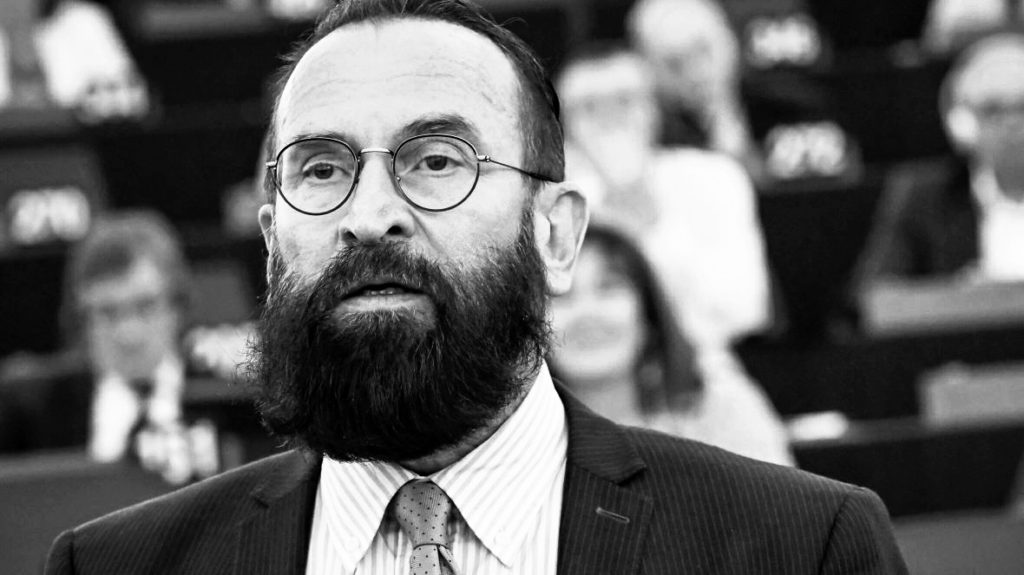BRUSSELS BEHIND THE SCENES
Weekly analysis and untold stories
With SAMUEL STOLTON
Other Brussels behind the scenes stories:
My name is Robert McCoy, and I’m an EU whistleblower
Could Biden give Barnier the Brexit he wants?
A mysterious red star raises questions in Brussels
The woman in Orbán’s crosshairs
The mind of József Szájer
Imagine the thoughts racing through the mind of József Szájer as, in a mad, naked frenzy, he clambered out of the window of the Brussels townhouse in which he had been partaking in a congress of the carnal variety.
Fleering from the 25-man lockdown orgy as police forced their way into the premises after being alerted to ‘strange sounds’ reverberating throughout the building, what were those fears that so summoned Szájer to make haste with such desperation?
BRUSSELS BEHIND THE SCENES is a weekly newsletter which brings the untold stories about the characters driving the policies affecting our lives. Analysis not found anywhere else, The Brussels Times' Samuel Stolton helps you make sense of what is happening in Brussels. If you want to receive Brussels behind the scenes straight to your inbox every week, subscribe to the newsletter here.
What thoughts were rebounding on the underside of this politician’s mind – a policymaker who himself drafted the 2011 Hungarian constitution, directly discriminating against same-sex marriage in the country?
Of course, on one level, they may simply have been terrors for his livelihood – having been a member of the European Parliament since 2004 and well aware of the political ramifications that the episode may entail for his far-right Fidesz party.
Then, there could have been fear for the damage that the scandal may do to his marriage, having been wed to high-profile Hungarian judge Tünde Handó since 1983.
Indeed, it may have also been the purely rational concern of being reprimanded by the authorities for partaking in a mass-gathering during Belgium’s coronavirus lockdown period.
But Szájer, as a founding member of the national-conservative Fidesz, probably had somewhat of a pang of tragic wakefulness, almost an epiphanous episode, at the moment the squad of Belgian policemen started knocking on the front door of the ill-famed party.
Fleeing as he did, in such a frantic, pitiable manner, plays analogously to the plight of the marginalized LGBT community in his own country – fleeing as they do, on a metaphorical or indeed a literal basis, every single day of their lives, in a culture that has profoundly demonized homosexuality.
What Szájer became aware of at the time of his daring escape, wasn’t just the collateral damage to his reputation, livelihood, or marriage: he had a sudden, puncturing and terrifying vision of his own sense of shame for an activity that should remain forever shameless in a modern, liberal democracy.
In essence, Szájer, for a brief moment of time, felt a sense of what it is to be an outed gay man, cocooned in the reality of an intolerable society.
But for his fortune, Szájer, resident of the liberal society of Brussels, had nothing to fear: In our world, there is nothing about the union of love between two men (or, in this case, a group of men) to be ashamed of. Brussels isn’t Budapest, Mr. Szájer.
Hungary’s anti-gay campaign isn’t just restricted to Szájer’s drafting of the constitution, which states that the country “shall protect the institution of marriage as the union of a man and a woman established by voluntary decision, and the family as the basis of the survival of the nation.”
Budapest has also proposed additional amendments to the constitution that would encroach on the rights of the LGBT community to adopt children, as well as further erosions to the legal recognition of transgender people in the country.
Yet despite the infuriating hypocrisy that emerges from the empire of fear that Fidesz have pained themselves to construct over recent years, a sense of hope in the ultimately devastating story of József Szájer prevails.
Because in many ways, after the sycophantic laughs of the swarming crowds have quietened, there remains at the heart of this story the achingly tragic image of a man so utterly afraid of the theatre of discrimination that he himself has built.
Szájer now has a choice. He can suppress himself even further and withdraw from public in an attempt to salvage any remnants of a ‘quiet private life’ he can. He would do so not only in the knowledge that this is above all a falsified existence, but he would also be extending the dominion of fear that Fidesz has substantiated in Hungary, to the detriment of millions in his own community.
On the other hand, Szájer can mobilise this newfound sense of fame that he has come into possession of, in order to help those who have felt so marginalized by the workings of his own hand. He could seize the opportunity to defend the people who for so many years he has discriminated against.
In Hungary, the LGBT community now looks to Szájer as an example of how an outed gay man in the country should carry his homosexuality with him in public. After having already made one grand betrayal, surely he shouldn’t make another?
BRUSSELS BEHIND THE SCENES is a weekly newsletter which brings the untold stories about the characters driving the policies affecting our lives. Analysis not found anywhere else, The Brussels Times' Samuel Stolton helps you make sense of what is happening in Brussels. If you want to receive Brussels behind the scenes straight to your inbox every week, subscribe to the newsletter here.

